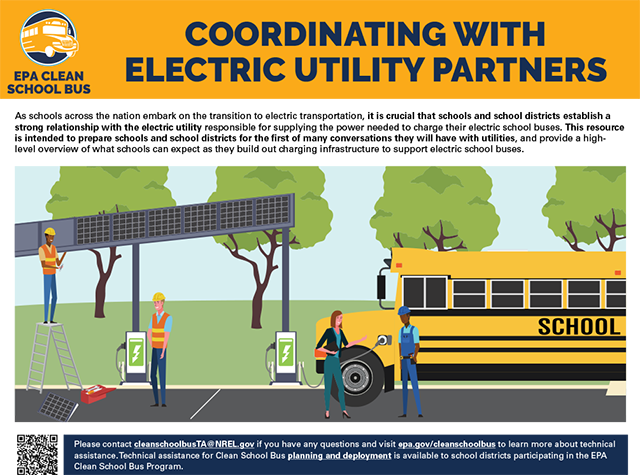Coordinating with Electric Utilities
When planning to transition a fleet to electric school buses, early and frequent communication with your electric utility is crucial to the success of the transition. This page details the steps required to effectively plan for electrification and links to resources that will assist school districts in guiding conversations with their electric utility. Additionally, free technical assistance is available from the Joint Office of Energy and Transportation by emailing: [email protected].

Coordinating with Electric Utility Partners Resource (pdf) (385 KB, February 2024, EPA-420-B-24-005)
- A resource created to help prepare school districts for the first of many conversations with their electric utility and provide an overview of what to expect throughout the electrification process.
Electric Sector Pledge Supporting School Bus Electrification (pdf)
To be responsive to stakeholder needs and questions surrounding utility engagement and collaboration, EPA entered into a pledge with two national electric sector organizations. Edison Electric Institute, the association that represents all U.S. investor-owned electric companies, and the Beneficial Electrification League, a non-profit organization that works closely with rural electric cooperatives and public power utility providers on electrification initiatives, to pledge support for school bus electrification. EEI members and BEL partners have pledged to proactively work with school districts to:
- Facilitate communication between electric providers and school districts; for information on the appropriate point-of-contact at your local utility, please email [email protected].
- Provide technical support and assistance
- Work together to increase funding and deployment for electric school buses
Public Electric Vehicle Charging Infrastructure Playbook* – Joint Office of Energy and Transportation.
- This tool provides an overview and framework to assist in planning EVSE, including evaluating future infrastructure needs and engaging community members and stakeholders about EVSE.
Summary of General EVSE requirements and recommendations in CSB funding programs** - Participation in the Clean School Bus Program requires Energy Star and NRTL certification for applicable charging equipment. EPA also recommends that applicable chargers be OCPP, UL, and/or ISO certified. Please review the links below and consult your electric utility with questions about your charging equipment and which certifications are required.
| Certification | Description | Recommended or Required? |
|---|---|---|
| Energy Star | Level 2 only | Required for all CSB funding |
| Nationally Recognized Testing Laboratory (NRTL) | Level 2 and DCFCs | Required for 2023 CSB Rebates
Required for 2024 CSB Rebates |
| Open Charge Point Protocol< | OCPP 1.6/2.0.1 | Recommended |
| Underwriters Laboratories | UL 2594 (Level 2)
UL 2202 (DCFC) |
Recommended |
| International Organization for Standardization | ISO 15118 | Recommended |
**Please refer to the Program Guide or Notice of Funding Opportunity for the specific CSB Funding opportunity you’re participating in for exact details.
